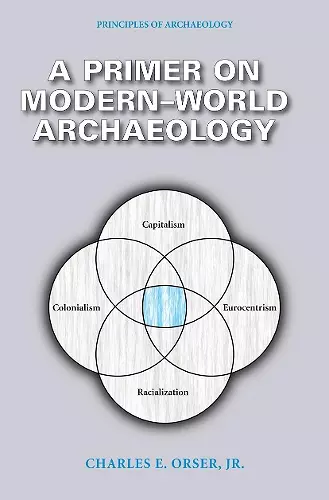A Primer on Modern-World Archaeology
Format:Paperback
Publisher:Eliot Werner Publications Inc
Published:31st Aug '14
Currently unavailable, and unfortunately no date known when it will be back

Focused on four overarching elements of the post-Columbian world (colonialism, Eurocentrism, racialization and capitalism), A Primer on Modern-World Archaeology is designed to introduce this new kind of historical archaeology to undergraduates, graduate students, and everyone interested in the material expressions of how the present world came to be. Major perspectives are presented in accessible language and study questions are provided at the end of each chapter.
Despite its slow development, historical archaeology has been steadily maturing over the past three decades. Archaeologists today are exploring daily life in the post-1500 world at an increasing pace, investigating sites throughout the world—frequently locales where historical archaeology was never before practised—using a variety of complex theories and perspectives. Given the explosion of worldwide research, it is now possible to create a new historical archaeology: a modern-world archaeology that explicitly explores modern life in all its variations, extending from local to global scales of analysis.
`Charles Orser returns to the haunts he introduced in the late 1990s, updates them, and inspires us to consider how 'modern-world' archaeological inquiry is relevant to our own time. In this primer Orser provides students with an intellectual platform to ensure that their research makes contributions to respectful, ethical, and sustainable decision making in cultural heritage and related fields.’ Kelly Dixon, University of Montana `Charles Orser's modern-world archaeology is an important intervention in the moribund literature of archaeological theory. With a deft hand, Orser lays out foundational principles for an archaeology that explains where we came from and where we are headed. This primer should be widely read by students and embraced by scholars interested in an archaeology that matters.’ Robert Paynter, University of Massachusetts `Charles Orser is the leading theoretician in global historical archaeology. His development of modern-world archaeology combines historical archaeological investigations of past capitalism and colonialism with anthropological concerns with present consumerism, consumption, and globalization. This primer is an excellent introduction to the application of local methods that allow archaeologists to join global conversations.’ Jonathan Pragnell, University of Queensland ’This brief and well-written book will be useful to professionals and students at all levels, from first-year undergraduates to advanced graduate students. Even those who are already familiar with this material and approach will find the book engaging. Teaching and practicing modern-world archaeology, as defined in this new book, is both challenging and exhilarating.’ William R. Fowler, Vanderbilt University `...Orser's book adopts a concise format; its eight short chapters briskly tackle big topics of global reach and cultural sensitivity. [...] Orser expresses his hope that modern-world archaeology can remain 'fresh and innovative at the same time that [...] it remains relatively free from the fads archaeologists often adopt' (p. 121). This is a tricky act to pull off but surely successfully achieved here.’ Robert Witcher, New Book Chronicle. Antiquity, 89 `[Orser's] highly accessible writing style makes his ideas easily comprehensible. [...] A Primer on Modern-World Archaeology reflects his commitment to this research program. The book gives students easy access to modern-world archaeology and is a quick read for archaeologists who want to understand Orser's program.’ Randall H. McGuire, Binghamton University, Journal of Anthropological Research, Winter 2015; Vol. 71, No. 4 `...Orser presents an excellent overview of his topic and provides much to think about. His clear and concise introduction to the theoretical underpinnings of modern-world archaeology alone makes the book worth reading. Orser should be commended for reiterating the importance of viewing sites within broader contexts, and also articulating the strengths and relevance of archaeology as a discipline.’ Brad Botwick, North American Archaeologist, Vol. 37(3), 2016
ISBN: 9780989824927
Dimensions: unknown
Weight: unknown
181 pages